INC2 Introduction
From Plastic Oceans International, Julie Andersen (CEO) and Mark Minneboo (Director of Advocacy), the second Intergovernmental Negotiating Committee (INC2). They actively participated in discussions and shared insights on information flow and legislative implementation gaps at the subnational level.
INC2 had over 1600 attendees from more than 170 countries converged at the UNESCO headquarters in Paris to hash out details of a potential treaty aimed at curtailing plastic pollution. Approximately 50% of attendees were country delegates representing 168 countries and the other 50% of attendees represented stakeholders from civil society, international governmental organizations, scientists, and industry with varying interests.
Despite the diplomatic obstacles to incorporate challenges and positions from all countries and stakeholders, the week-long session of INC2 reached a promising conclusion. The completion of INC2 marks the progress of 40% on the path to the creation of a treaty. Therefore, it’s important to remember there are more challenges to overcome.
Week of INC2 Recap
The inaugural day was marked by inspiring speeches from UNEP Executive Director Inger Andersen, France’s President Emmanuel Macron, and the INC Secretariat Executive Secretary Jyoti Mathur-Filipp. The primary objective was to establish the mandate for a zero-draft text for the treaty. Despite initial challenges from some countries on procedures, country delegates negotiated in the early morning hours to overcome a deadlock by day three (3).
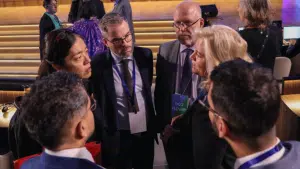
Delegates from Brazil, Norway, and the EU consulting informally Photo by IISD/ENB | Kiara Worth
The start of day 3, country delegates began sharing their perspectives on plastic pollution and potential solutions.. The reports from these contact groups were crucial for the secretariat to start drafting the treaty by INC3 in November.
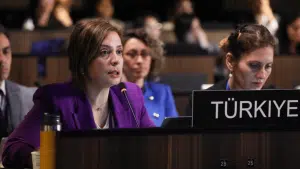
Sadiye Bilgiç Karabulut, Turkey Photo by IISD/ENB | Kiara Worth
Each day for 1 hour, there were multiple side events held. The side events were organized by the UN and intended to expand delegates’ knowledge and showcase global solutions. These events highlighted the multifaceted nature of plastic pollution and the necessity for holistic solutions, rather than focusing solely on downstream waste management interventions.
The side events offered an incredible amount of information and the importance of collaboration as a way forward. Unfortunately, due to limited time, space and the resources to record, the access to all information provided was challenging.
This highlighted the critical need for a system of information and engagement available not only to country delegates but to all stakeholders.
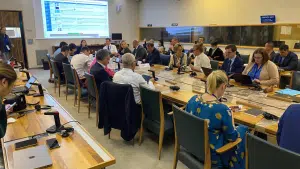
Tuesday side event about monitoring the future instrument’s progress.
Over days 3 and 4, delegates worked painstakingly to review the options paper, laying bare their visions and interests. Certain nations, like Saudi Arabia, Brazil, and China, favored national and voluntary action plans, while others were more ambitious.
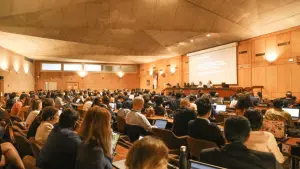
Gathering of Contact Group 2 Photo by IISD/ENB | Kiara Worth
The concluding session on Friday was marked intense deliberation. With the secretariat finally receiving its mandate. The second INC ended on a high note, with the secretariat empowered to begin drafting the treaty. Nairobi. Kenya, Ottawa, Canada, and South Korea.
Next Steps
Regrettably, intercessional work was not decided. Which could have advanced the process between INC2 and INC3. There is still a lack of consolidated definitions for key concepts like. “Problematic or unnecessary plastics,” “sustainable plastic production and consumption,” and “circular economy.”
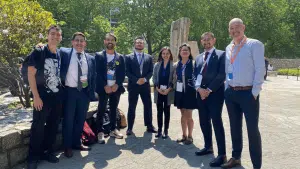
Our Director of Advocacy Mark Minneboo with the Chilean Delegation and NGO´s
The role of Plastic Oceans International, using our film-activism model, is to facilitate the flow of information from upstream to downstream and engage in meaningful country dialogues to enable local-level execution.
Support our advocacy work to end plastic pollution. Learn more about our role in the global treaty to end plastic pollution HERE.
Julie Andersen is the CEO and Founder of Plastic Oceans International. Julie’s Plastic Oceans work combines her career protecting human and environmental health, life sciences education and love for the ocean. She has worked in public health and nonprofit management internationally for the past 20 years, including the US, Japan, Hong Kong and Thailand.

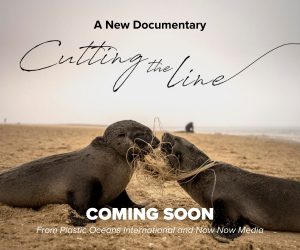
Trackback: ruay91
Trackback: namo333